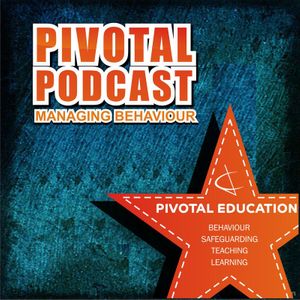“Yes We Can!” with Headteacher, Rae Snape – PP188
Pivotal Podcast - A podcast by Pivotal Education

Categories:
Rae Snape has been headteacher at The Spinney School in Cambridge since 2007. She is also a member of the DfE’s Primary Headteachers’ Reference Group where she has been helping the government reflect on its policies since 2010. What tips would you give to headteachers who are currently implementing change and school improvement? Rae points out that there are two meanings of the word ‘time’ in Ancient Greek – * Outward time – over the period of months and years where things can seem very chaotic * Inward time – the smaller sense of time where you have much more control If we concentrate on those micro aspects of time – what’s happening today, for example – the balance can be much easier to manage. We should concentrate on the people and the relationships around us while at the same time also being mindful of a balance with medium and long term plans. Dealing with change “I think teachers are amazingly flexible, resilient creatures.” Rae works with academics from the local Cambridge University and they compared approaches in academia to schools. In academia you can plan, prepare and take the time to think but in schools a change can be thought about on Monday morning and in place on Tuesday afternoon. “[Teachers] just roll their sleeves up and get on with the job.” Most experienced teachers, according to Rae, understand which battles they are not going to be able to win and so, in the interests of the children, they just get on with it. What does leading with hope and optimism look like on a daily basis? In their latest Ofsted inspection, the lead inspector called The Spinney ‘forward thinking and outward reaching’. This spurred on the school to continue making connections, building relationships. Rae believes that the more connections you can make and the more you reach out to people, the more positive your school will be. Despite always being mindful of safeguarding, this led to an ‘open school’ culture and a desire to connect with artists, researchers, businesses and the local community. This has created a sense of joy and positivity in the school. What practical changes could we make to schools to make them more positive places for teachers and learners? Rae says that we need to look at the public vilification of schools whose test results don’t show what was hoped for. Naming and shaming of schools in the press and on the web is fundamentally unfair, according to Rae. This doesn’t mean we shouldn’t hold schools to account for high standards. “For there to be winners there must be losers and this can’t be right.” That sense of positivity starts from outside the school for Rae. There are small sculptural installations outside her school which have been created in partnership with local artists. There are also art objects around the inside of the school and Rae believes that schools should be beautiful places. Also, all members of staff ensure that there are lots of smiles and warmth around school. “We are quite obsessive about cups of tea.” Warm drinks are actually shown by research to be important. Not only do people feel welcomed with a hot drink, they also tend to rate the host with a stronger sense of credibility as a result. Cambridge Festival of Education This is a new initiative to celebrate hope and optimism in the workforce. It’s easy to gravitate towards the negative in education so this event is a deliberate attempt to shift thinking to a positive standpoint. It’s about honouring teachers who do such a wonderful job but sometimes don’t get the kind of credit they deserve. @RaeSnape